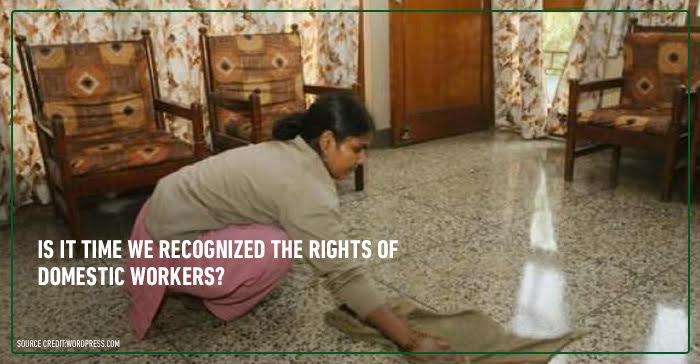What is being done to protect India’s domestic workers?

The Rajasthan government has implemented minimum wages and standard working hours for domestic help, starting 1st January 2016. This is a major step in fighting the widespread exploitation of domestic workers not only in Rajasthan, but in India as a whole. Let’s get a better understanding of the need to look at the work conditions of domestic workers in India.
Who are domestic workers?
The National Sample Survey Organization (NSSO) classifies the following occupations as domestic labour: housemaid/servant, cook, gardener, gatekeeper/chowkidar/watchman, governess/baby-sitter, tutor, driver and “others.” India had 4.2 million domestic workers during the year 2004-2005 (National Sample Survey Organization) of which women comprised the majority, and the number of domestic workers in urban areas increased by 68 percent between 1999-2000 and 2009-2010.*
What are their working conditions?
Domestic workers fall under the unorganized sector of the economy therefore their conditions are not regulated or supervised. Since they are not recognised under India’s labour laws, they are marginalized and often exploited. There are no formal employment contracts, leading to poor bargaining power, no legislative protection and inadequate welfare measures and meagre salaries. Domestic help earn as little as Rs.169.32 per day for men and Rs.64.79 for women.**
What has the government done to help them?
There have been efforts by the government to improve the conditions of domestic help. Tamil Nadu has included domestic workers in their Manual Workers Act. Karnataka and Kerala have notified a minimum wage for domestic workers.
Rajasthan has now introduced a more comprehensive notification aimed towards improving the condition of domestic workers.
Here are a few points on the notification issued by the government of Rajasthan:
The work hours for domestic help have been set at 8 hours a day. Anything over that is to be considered as overtime.
The minimum wage for domestic help is now set at Rs.5,642 per month, exclusive of food, accommodation and any other perks. Overtime hours are paid at double the rate.
Domestic help hired only for dishwashing and laundry are to be paid at Rs.705 per month for a household of four members. Above this they are to be paid 10 percent more for every additional household member.
This notification is applicable as of 1 January 2016, and will be enforced through surprise inspections.
This might be a very important step towards improving the conditions of millions of domestic workers in India.
Further, a draft National Policy for Domestic Workers from the Union Labour ministry seeks to provide a minimum wage of Rs.9000 per month, in addition to 15 days paid leave in a year for domestic workers, along with maternity leave.
The Rajasthan notification along with this policy may hopefully pave way towards better, more dignified working conditions for the large population of Indian citizens who comprise the domestic workforce.
While laws can change the situation of the unorganised labourers, we as citizen also need to do our bit towards it. How do you think we can prevent exploitation of workers in the unorganised sector? Share your views on this issue on our Facebook and Twitter pages, or email us at jaagorein@gmail.com.
Sources:
*India Today
Livemint
**United Nations in India
Weigo
Share this story on





